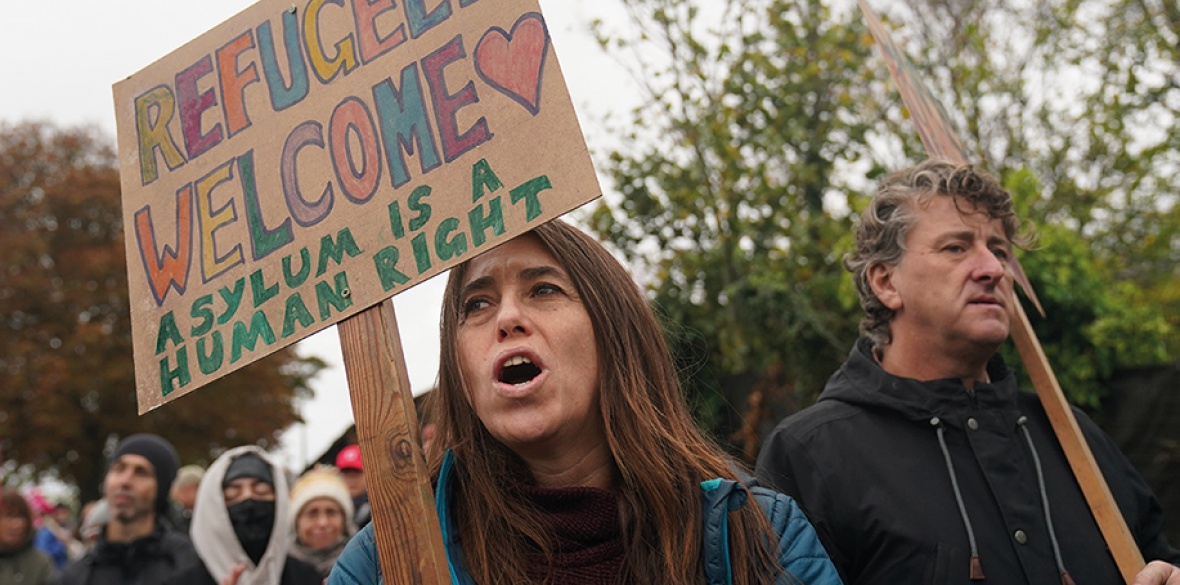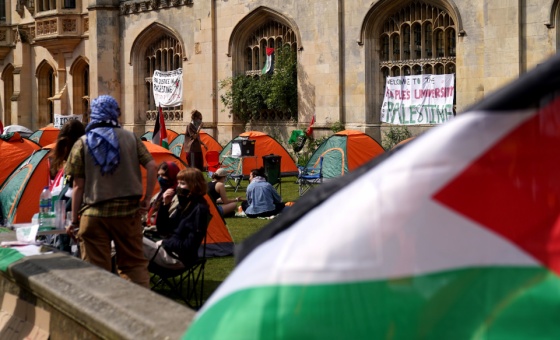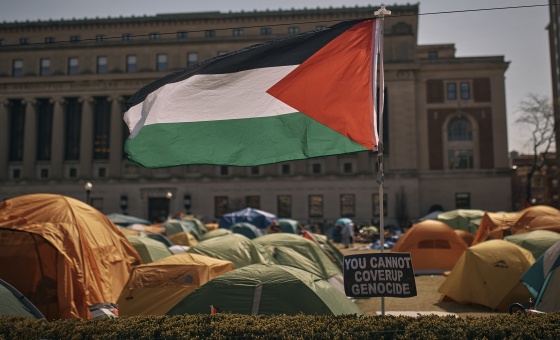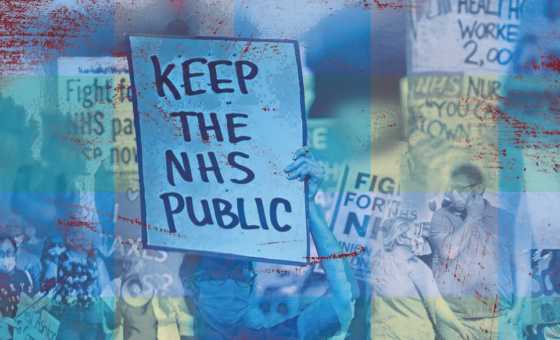This is the last article you can read this month
You can read more article this month
You can read more articles this month
Sorry your limit is up for this month
Reset on:
Please help support the Morning Star by subscribing here
SIX years ago the European Union added its voice to the global popular outrage at Donald Trump’s plan to build a wall between the US and Mexico.
Trump’s wall was a motif for all that is wrong with his brand of nativist reaction. European governments marketed themselves as the liberal internationalist counterforce to the “illiberal democrats” who saw Trump as their champion.
Since then, Trump failed to get re-elected and the EU and its component states have built over 1,000 kilometres of wall and razor fencing on their borders and internally.
Greece last year completed a fortified fence on its 40km (25 mile) land border with Turkey. In recent years walls have been built in Spain, France, Greece, Hungary, Bulgaria, Austria, Slovenia, Slovakia, Latvia, Estonia, Norway, Lithuania and Poland.
In three of those cases the barriers are between EU countries, which at the same time cite the principle of European freedom of movement.
The wall-building is accelerating and the authoritarian impact of these militarised borders does not stop on the frontiers.
It expresses itself in the ever greater securitisation of everyday life and the curtailment of civil and democratic rights — for citizens as well as non-citizens. The razor wire rises: the police baton falls on another head.
The excuse offered by one government after another is the need to halt “irregular migration flows.” The sugar coating is development aid and greater trade with “sending countries” in order to “deal with the problem at source” while clamping down on the people smugglers.
The British government’s incantation of the same formula is somewhat undermined by the further cuts it has announced to the overseas aid budget.
But it is the cumulative impact of the trade, security and foreign policy of the EU that is the major factor in the conditions that are uprooting people and leading to rising inward migration flows, overwhelmingly involuntary.
Greece’s Minister of Citizens Protection Michalis Chrisochoidis brushes off the scandal of illegal pushbacks of dinghies to Turkey and, like Suella Braverman in Britain, claims that none of those seeking entry are “genuine refugees.”
If they were, goes the argument, they could choose one of the “legal routes” — presumably one of those that Braverman in Parliament this week was unable to identify for someone fleeing a war or social collapse in east Africa. (Because there isn’t one.)
Yet the Greek government has also accepted that 45 per cent of those arriving on the Aegean islands up to April of this year were from Afghanistan.
That is not surprising following the chaotic US and Western withdrawal in August 2021. Sanctimony then about not abandoning the Afghan people to the brutal rule of the Taliban has given way to exactly that abandonment.
The reports from Afghanistan of hunger and oppression, alongside courageous protest, move us but not our governments.
The EU held an emergency meeting of interior ministers within a week of the Afghan pullout to “to act jointly to prevent the recurrence of uncontrolled, large-scale, illegal migration movements faced in the past.”
The result has been an expansion of the security and anti-migration architecture. That was in response to the possible movement of hundreds of thousands of people who as victims of war, occupation, an earlier proxy war, civil war, economic collapse and a brutal regime are by any stretch of the imagination refugees.
All this alongside withholding Afghan currency reserves and thus intensifying what is nothing short of starvation in the country.
That is of a piece with policy closer to home. In November 2015 European and African government leaders met to agree “a common approach to addressing migration.”
It was as the major flow of refugees from the Syrian civil war was reaching Europe. There was panic in European capitals and a desperate rush to stop any repeat. This was when there was widespread public support in most countries for the refugees, just as there is today for those fleeing the proxy war in Ukraine.
Greece was suffering the full force of the austerity memorandums. Still 85 per cent of people said “the government must help the refugees.”
It was only later that racist and far-right forces were able to build significant anti-refugee agitation. The reason for that was the approach taken by the governments.
It was to bend every area of policy — from trade to aid to ostensibly promoting human rights — towards the goal of stopping people coming to Europe from the south and east.
The fate of the philanthropic (and patronising) sounding EU Trust Fund for Africa is an illustration. It was designed as a progressive fig leaf covering the hard power security and defence arrangements between the EU and various African states.
But a report by Oxfam in 2019 — added to by other researchers since then — found that the largest chunk of the €5 billion fund went directly to “migration management.”
Even the parts of the programme to do with creating local employment and development were conditioned by achieving the overarching aim of stopping Africans coming to Europe.
The Ethiopian government became eligible for some of the fund in December 2016. Then the money stopped. It received nothing for almost all of 2017 until it signed an agreement accelerating the return of Ethiopian nationals from EU countries.
Within days it received €14 million for “stimulating economic opportunities and job creation” for refugees within Ethiopia.
Some 80 per cent of those uprooted by war, economic dislocation and climate change in Africa end up as refugees in a neighbouring African country. Only 1 per cent — €56 million — of the Trust Fund has been spent on “legal pathways” to come to Europe.
At the same time there are hardening borders within the African continent as the impact of Fortress Europe cascades southwards.
The flow of energy, food, natural resources and goods manufactured with cheap labour is not hindered. The mechanisms have changed from the immediate post-colonial period, but domination remains. The result is extreme maldevelopment in a region that has the fastest growing population globally.
This is in conditions of climate chaos that is already desertifying the Sahel region. It is contributing to the spreading wars and insurgencies.
The French government of Emmanuel Macron last year had to admit that its military operation in Mali, west Africa, had failed — at the cost of 55 French troops.
France now looks to a slimmed-down European operation which is but window dressing for the reality that the old colonial methods have not created “stability.” The Malian government has expelled French NGOs and extensions of the French state.
The first two years of the pandemic drastically reduced cross-border movement. Now it is bouncing back. A large part of the rise reported this week in “migration” to Britain was in fact overseas students on visas and paying astronomical sums to the businesses once known as universities.
But there is no doubt that war, economic chaos, climate change and political instability mean that the numbers seeking to come to Europe — escaping in part the effects of European policy — and to Britain will rise.
Instead of any kind of humane and logical response in a continent that sees people living longer as an economic time bomb, we see only more razor wire, more xenophobia and more exploitation of people and their resources on the frontier.
That includes the issuing of temporary work permits for skilled workers or those in areas of extreme labour shortage.
There is nothing progressive about using market power to squeeze the small Kenyan farmer producing green beans and preventing him and his family from coming to Europe, while cherry-picking a Kenyan doctor to work in a European health system with limited residency and political rights, but deploying the skills the Kenyan education system taught her.
The EU and Britain want their “share” of Nigerian biochemistry graduates. But vaccine supply to northern Africa has been largely the Chinese Sinopharm and the Russian Sputnik V, and not from Europe.
The result of all of this is also to boost the prospects of the racist and far right.
The EU held another emergency meeting of home affairs ministers this Friday. On the agenda was stopping the activity of NGO rescue ships in the Mediterranean that step in where Nato and the EU refuse, preferring instead to work with the murderous Libyan militias to cut the refugee flows.
The flows will not stop. The spiralling crises mean that people will try to come. The only issue is whether they are killed or not in the process.
When ordinary people understand that that is the real choice and that the anti-immigration loudmouths have no answers, then the essential humanity and solidarity in the working class may come to the fore.
We will only win an approach that welcomes people who are on the move, and that ends the crises that force so many to move against their will, through a fundamental reordering of society.
That begins at home. A key part of that as revolt grows across Britain and Europe at the social crisis engulfing the working class is to refuse the diversionary and divide and rule tactics of our rulers.
They militarise frontiers for us, but their regime of exploitation knows no borders — at home, abroad, the established citizen, and the migrant newcomer.












